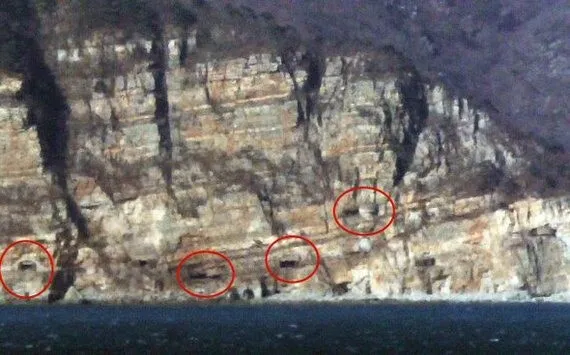hankyoreh
Links to other country sites 다른 나라 사이트 링크
10 N.Korea artillery shells land south of NLL

The Joint Chiefs of Staff said Tuesday that of the roughly 110 artillery rounds fired off by North Korea in the direction of the West Sea Northern Limit Line (NLL) on Monday afternoon, about 10 crossed the NLL and fell in the waters of Baengnyeong Island. This is the first time North Korean artillery shells have fallen south of the NLL.
An official from the Joint Chiefs of Staff said Tuesday that the point of impact of the North Korean coastal artillery shells was confirmed to be the seas near Baengnyeong Island, about one or two kilometers south of the NLL. The Joint Chiefs of Staff, based on testimony from soldiers on patrol and analysis by relevant departments, concluded that about 10 shells fell in the waters off Baengnyeong Island, about one or two kilometers south of the NLL. It said that all 100 shells that fell in the waters off Yeonpyeong Island fell north of the NLL.
The Joint Chiefs of Staff initially announced Monday evening that all the North Korean shells fell north of the NLL.
The Joint Chiefs official said, “Confirmation of the point of impact comes from splash the shells make as they hit the water, but as the waters of Baengnyeong Islands were experiencing 2.5m waves at the time, it was difficult to conclude that the shells crossed the NLL based on soldiers’ visual observations alone.”
President Lee Myung-bak, in announcing on May 24 his follow-up measures to the sinking of the Cheonan, said, “In the future, South Korea will immediately exercise its right to self-defense when its territorial seas, air and territory are forcefully violated.”
Since South Korea has regarded the waters south of the NLL as territorial seas, according to Lee’s statement, the North Korean artillery as an armed violation corresponds to a condition for the exercise of the right of self-defense.
If South Korea considers the North Korean coastal artillery fire an armed provocation, responding fire into North Korean waters north of the NLL or retaliatory attacks on North Korean coastal artillery bases are counted as options for self-defense. In that case, it could turn into a limited inter-Korean war near the five West Sea islands. The military authorities, however, have taken a step back from a hardline response such as responding fire. The Joint Chiefs of Staff said, “Following North Korea’s coastal artillery fire, South Korea used international shipping communications to warn North Korea three times. There were no additional provocations, so we held off with return fire.”
In a message sent to the head of the North Korean delegation for inter-Korean military talks, the Defense Ministry demanded an immediate end to the surprise artillery fire, which it called a grave violation of the Armistice and inter-Korean non-aggression agreements.
A military official said, “North Korea’s artillery fire was designated as a grave provocation in the message sent to North Korea, but no decision has been made on whether to restart psychological warfare broadcasts.”
The Defense Ministry said during a policy explanatory meeting on July 17 that if North Korea committed additional provocations, South Korea would restart full-scale psychological warfare operations using loudspeakers at the DMZ.
The military’s careful posture is reportedly due to consideration of an ill economic impact on the upcoming G20 summit, to be held in Seoul in November, and on the economy.
Meanwhile, North Korea’s KCNA reported that the Rodong Shinmun, the newspaper of North Korea’s ruling Workers Party of Korea, warned that Pyongyang would “show those buoyed by war fever what a real war is like through a war of retaliation of its own style, based on its nuclear deterrent,” mentioning the South Korean naval drills in the West Sea that concluded Monday.
Please direct questions or comments to [englishhani@hani.co.kr]
Editorial・opinion
![[Guest essay] The silent calculus behind world leaders’ flattery of Trump [Guest essay] The silent calculus behind world leaders’ flattery of Trump](https://flexible.img.hani.co.kr/flexible/normal/500/300/imgdb/original/2025/0826/7517561977732305.jpg) [Guest essay] The silent calculus behind world leaders’ flattery of Trump
[Guest essay] The silent calculus behind world leaders’ flattery of Trump![[Editorial] Lee’s concessions to Japan on history, security leave bitter taste [Editorial] Lee’s concessions to Japan on history, security leave bitter taste](https://flexible.img.hani.co.kr/flexible/normal/500/300/imgdb/original/2025/0825/831756112945105.jpg) [Editorial] Lee’s concessions to Japan on history, security leave bitter taste
[Editorial] Lee’s concessions to Japan on history, security leave bitter taste- [Editorial] ‘Yellow Envelope Act’ is a new chapter in Korean labor rights
- [Column] The era of playing both ends against the middle
- [Column] Praying for the safety of Rajaa and all of Gaza City
- [Column] Korea needs to answer Trump’s climate denialism with bold policies
- [Guest essay] True resolution of the ‘comfort women’ issue, as both victim and perpetrator state
- [Editorial] Inquiry must clarify if gov’t pressure led to unfair Westinghouse settlement
- [Column] Does ‘KPop Demon Hunters’ count as Korean? Does it matter?
- [Editorial] Trump and Putin’s Ukraine deal is a warning to countries like Korea
Most viewed articles
- 1[Guest essay] The silent calculus behind world leaders’ flattery of Trump
- 2Korea breathes sigh of relief after Lee’s cordial summit with Trump
- 3Korean president’s actions amounted to criminal insurrection, many legal experts say
- 4USFK sprayed defoliant from 1955 to 1995, new testimony suggests
- 5‘Purge or Revolution’? Post by Trump prompts confusion ahead of US-Korea summit
- 6‘Big progress’ with North Korea possible if South Korea works with US, Trump says
- 7Lee and Trump establish rapport at summit, but experts say challenges remain
- 8[News analysis] Hyon Yong-chol’s execution: growing instability or stabilization?
- 9Trump offers to arrange meeting of North, South Korean leaders at APEC summit in October
- 10[Editorial] ‘Yellow Envelope Act’ is a new chapter in Korean labor rights